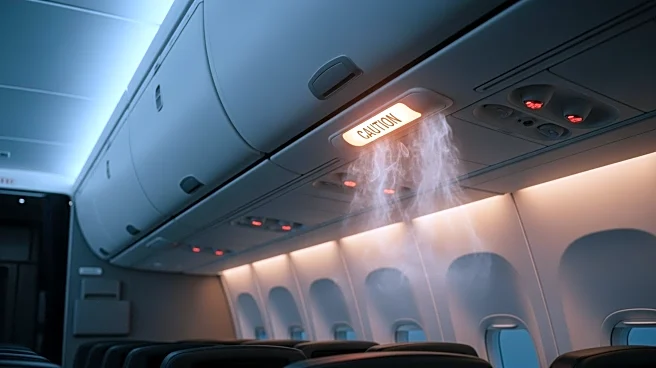What's Happening?
An Air China flight from Hangzhou to Seoul was forced to make an emergency landing in Shanghai after a lithium-ion battery in a passenger's carry-on luggage ignited, causing a fire in the overhead bin. The incident occurred on Air China flight CA139,
an Airbus A321-232. Flight attendants quickly responded by using fire extinguishers to douse the flames and instructed passengers to remain seated. The pilots declared an emergency and diverted the flight to Shanghai Pudong Airport, where it landed safely. Fire crews met the aircraft upon arrival, and all passengers disembarked without injury. Air China arranged a replacement aircraft for those continuing to Seoul.
Why It's Important?
This incident underscores the ongoing safety challenges posed by lithium-ion batteries on aircraft. Such batteries, commonly found in personal electronic devices, can enter a state of thermal runaway, leading to fires that are difficult to control. The event highlights the importance of stringent safety protocols and the need for airlines to equip aircraft with appropriate fire containment measures. The aviation industry must continuously adapt to these risks to ensure passenger safety. The incident also raises questions about the policies regarding the carriage of electronic devices in the cabin versus the cargo hold, as fires in the cabin are more manageable.
What's Next?
Airlines may review and potentially update their safety protocols regarding the handling of lithium-ion batteries. There could be increased emphasis on passenger education about the risks associated with carrying such batteries. Regulatory bodies might also consider revisiting guidelines to enhance safety measures. The incident may prompt other airlines to reassess their emergency response procedures and equipment to better handle similar situations in the future.
Beyond the Headlines
The incident could lead to broader discussions about the design and safety of consumer electronics, particularly those powered by lithium-ion batteries. Manufacturers might face pressure to develop safer battery technologies or improve existing ones to prevent such occurrences. Additionally, the event may influence future regulations on the transportation of electronic devices, potentially affecting consumer behavior and airline policies.














